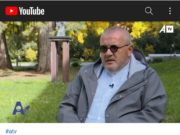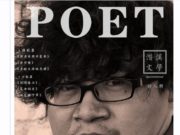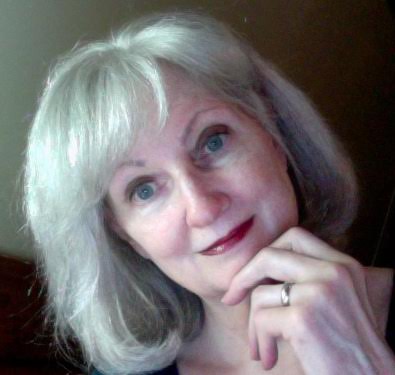Beth Copeland’s second book Transcendental Telemarketer received the runner up award in the North Carolina Poetry Council’s 2013 Oscar Arnold Young Award for best poetry book by a North Carolina writer. Her first book Traveling through Glass received the 1999 Bright Hill Press Poetry Book Award. Her poems have been published in numerous literary magazines and anthologies, including The Atlanta Review, New Millennium Writings, The North American Review, Pirene’s Fountain, Poet’s Market, Rattle, The Southern Poetry Anthology, Tar River Poetry, and The Wide Shore: A Journal of Global Women’s Poetry. She has been profiled as poet of the week on the PBS NewsHour web site. Beth lives in a log cabin in rural North Carolina.
Shinto Scroll
Red-crowned cranes in delicate
brush strokes on silk
between a gray
and gold brocade
border. An almost invisible
white, they pause on Hokkaido
snow before a hyacinth
blue lake. One, tall
on long legs; the smaller one’s
bill tucked into a black
tipped wing. Symbolic
of longevity and love
that weathers time
and cold, they will never fly,
folded wings caught
on an antique bolt
I roll into my suitcase
before I leave.
Featherweight Singer
My mother ferried her sewing machine
across the Pacific four times, stitching
continents as if
they were linen scraps—America
to Asia, Asia to America—following
Daddy as he exchanged his
version of heaven
for a suitcase of Shinto
scrolls. I fell
asleep to the white noise of that
black machine, to the song of steady
seams like wind in cottonwoods
or rain on rafters, to my mother’s breathing
when I climbed her bed after bad dreams.
My sisters and I wore our Sunday best—puffed
sleeves, gathered skirts, and sashes
sewn on the Featherweight Singer as we slept.
When I was fourteen, she tried to teach me
to pin Simplicity patterns to fabric and cut
on printed lines, but I—sullen
and careless, too young
to believe I’d ever be alone—
thought she’d never leave. On her old
machine, I sew silk
infinity scarves for sisters
and friends from vintage Varanasi
saris, listening to my
mother’s song in the rise
and fall of the needle and World without
end—whir of the unwinding
spool—amen, amen.
Escape Artist
No one believed the old man
would escape with a Wanderguard
strapped to his wrist like Houdini’s
handcuffs. Hunched
at the glass door, from beneath
hooded eyelids he watches
nurses punch codes to lift
the latch. Once
they found him at a gas station
across the street in a wheelchair, waving
as they wheeled him back. A janitor
found him on a landing
after he pulled himself down
a steep flight. The staff call
his escapes elopements, as if
he’s running off with a bride
instead of leaving a locked
Alzheimer’s wing. He believes
Mother and I sleep in the room
next door and the nursing home’s a hotel.
A master of the art of escape, he left her
to cross the ocean with four little girls while he
took a whirlwind trip around the globe, sending
postcards from Singapore,
Jordan, Switzerland, and a green taffeta
dress from Paris she never wore. Watch
him escape from this riveted trunk, breaking
chains, unlocking all locks, that sneaky
sweet old son of a fox.
Kintsugi
Mother’s Japanese friends
send cards she forgets
to open—prints of blond
birds flying
over turquoise waves, pine branches
burdened with snow. Her mailbox,
stuffed with letters
and junk. I slice
into an envelope and pluck a handwritten
note from Kinko-san: I have not heard
from you. I am worried. You are so
old. Mother snorts, She’s
almost as old as I am!
and we laugh
at what’s lost
in translation. She forgets bills,
to brush her teeth or swallow
her thyroid pills and Lipitor
but remembers Kinko-san
from long ago. Should I write to say you’re
okay? I’ll do it
later, but she won’t. She stares
at a maple for hours when I’m
not here, her hair a corona
of uncombed
dandelion seeds. Should I
laugh or cry? Like a broken
bowl mended with molten
gold, she’s more
beautiful than before. I hold
her in the heart
of my heart
where she’s whole.
Keeping Time
In the blue wheelchair, his eyes
open when I enter. Does
he know me? Maybe
he dives into the resemblance
to a snapshot
pinned to his wall. At 94,
he drifts in and out of distant time
zones and forgotten memories. We graze
National Geographic, snowflakes, maple
leaves, and stars magnified
thousands of degrees. The clock
doesn’t advise
me to stay or leave, his watch
somewhere still keeping time. When
I was small, I’d hop onto his lap
while he held it to my ear, the gold
warm from his wrist. As I
listened to its ticking, I believed
he could hold back
time forever, a pulse that
would never stop.
Sandhills Gold
… in the Sandhills of North Carolina, a few lucky beekeepers strike blue gold. –Chick Jacobs
The year Daddy died, beekeepers found blue
honey in their hives. How it turns
blue or why it only happens
here no one knows. Some
think bees feed on bruised huckleberries, scuppernongs
or kudzu blossoms. Too far inland, Daddy
never found it in the forty-five years
he kept hives. In the nursing home, I talked
blue honey into blue eyes that
stared back in a blur
of lost memory and sleep. What
was he thinking? I spoke
of his veiled hat and long gloves,
bellowing hives
with smoke so he could pull combs and
honey from inside, and pour sourwood
into old Mason jars in slow motion
like the lengthening summer day
when the sky was so delphinium
it could be music, or the blue
shadow that followed me through the doorway
into the buzzing of bees when I
was thirteen, crying behind the pear tree because
I wasn’t popular enough to be
May Queen. This is what I choose
to keep against forgetting:
You’ll always
be my queen,
he said, bending
to kiss my forehead. I carry
that moment like a bee
in amber on a gold chain
above my heart to ward off wintering
broods and dark swarms, a queen without
a country or hive, standing in slanted light
as bees droned
around my head, weaving a crown of wings
and buzzing with sweetness.
*****
Grief like honey left too long in the jar,
like the pint we bought last year
from a beekeeper who used to sell pot,
in the pantry all winter flanked by bottles
of blackstrap and Hungry Jack
crystallizing in the dark,
too solid to spoon onto bread unless you melt it
in water on the stove. Impatient,
I spread the gold grains on my toast, remembering
when he was alive and it
poured in slow
measures onto my mother’s home-baked bread. One
summer he visited me in Chicago after robbing
his hive of a quart jar of sourwood, his
ankles so swollen
from stings he slept with his feet propped
on pillows. I want this
grief to dissolve like a lemon
lozenge on my tongue, I want
to taste the sweetness
of mornings
before sorrow, anger, and remorse
soured my vision of being
young and oblivious to his
pain, I want my words to flow
like a vein
onto the blue-lined page as holy
honey flowed from his white
hives onto our bread, tongues, lives.


















